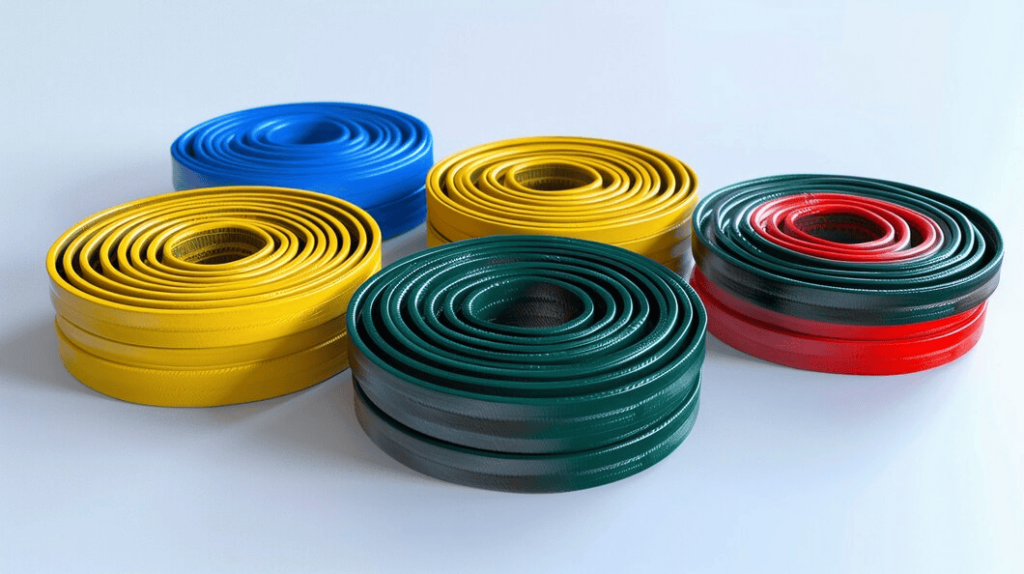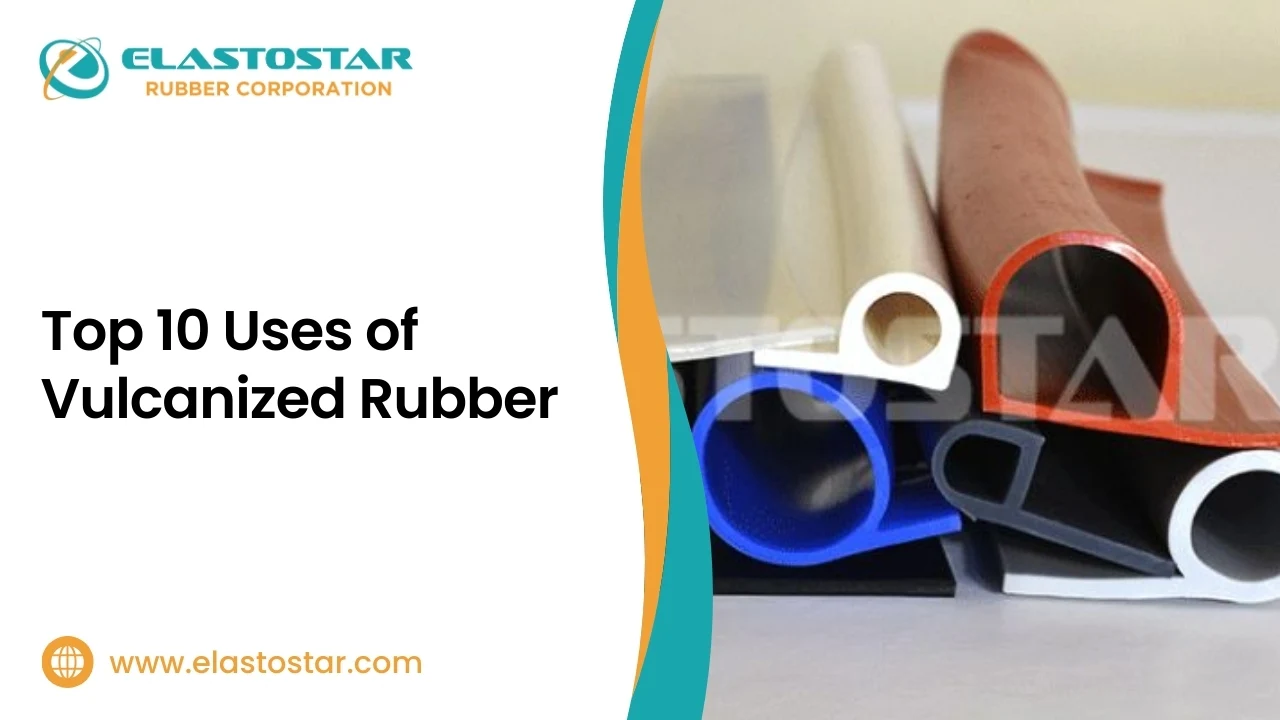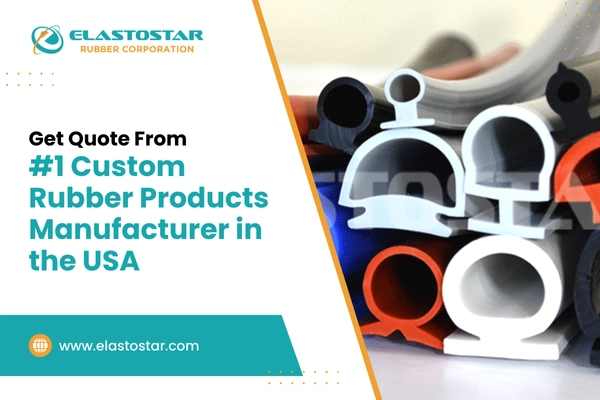Vulcanized rubber has become a key material in modern industries due to its exceptional properties, such as enhanced strength, durability, and resistance to heat, chemicals, and wear. This material, created through the vulcanization process, revolutionized the usability of natural rubber, overcoming its limitations like stickiness and brittleness.
From automotive components to medical equipment and household products, vulcanized rubber plays a vital role in applications where performance and resilience are non-negotiable.
In this blog, we explore the top 10 uses of vulcanized rubber, its benefits, and its significance across diverse industries.
Table of Contents
What is Vulcanised Rubber?

Vulcanized rubber is a processed form of natural rubber that has been chemically treated to improve its properties. This process, known as natural rubber vulcanization, involves heating raw rubber with sulfur or other curing agents. The result is a material that is stronger, more elastic, and resistant to extreme temperatures, wear, and chemical exposure.
Before vulcanization, natural rubber was soft, sticky, and unstable in varying weather. The introduction of this process revolutionized rubber’s usability, making it suitable for industries like automotive, construction, medical, and consumer goods.
The Invention of Vulcanized Rubber
The discovery of vulcanized rubber is credited to Charles Goodyear, who, in the mid-19th century, accidentally found that heating natural rubber with sulfur transformed it into a stronger, more durable material. This chemical reaction, later known as the vulcanization process, marked a turning point in the rubber industry.
Before Goodyear’s breakthrough, natural rubber was unreliable—becoming sticky in heat and brittle in cold. By introducing the process of vulcanization of rubber, Goodyear created a material that could hold extreme conditions, paving the way for its widespread use.
Read More- Vulcanization of Rubber: History & Origin
What is the Vulcanization of Rubber?
Vulcanization is a chemical process that transforms natural rubber into a more durable, elastic, and heat-resistant material. This process addresses the limitations of raw rubber, such as stickiness in heat and brittleness in cold, making it suitable for diverse industrial applications.
The Rubber Vulcanization Process
The vulcanization process of rubber involves-
- Heating natural rubber with sulfur (or other curing agents).
- This causes a chemical reaction that forms cross-links between rubber molecules, creating a strong and flexible structure.
- The result is a material that retains its shape and strength under stress, heat, and environmental exposure.
What Does Vulcanisation Mean for Rubber?
Vulcanization means that rubber becomes-
- Resistant to wear and tear.
- Flexible while maintaining strength
- Stable across extreme temperatures
Properties That Make Vulcanized Rubber Unique
The table below highlights the properties of vulcanized rubber that make it an ideal material for various applications across industries.
| Property | Description |
| Enhanced Strength & Durability | Vulcanized rubber maintains its structure and strength even under extreme stress or conditions. |
| Resistance to Chemicals | It resists degradation when exposed to oils, chemicals, and solvents. |
| Heat and Abrasion Resistance | It withstands high temperatures and remains durable against physical wear and abrasion. |
| Improved Elasticity | The material retains flexibility and elasticity, making it suitable for dynamic applications. |
| Versatility in Applications | Its properties allow usage in diverse fields such as automotive, construction, and electronics. |
Top 10 Uses of Vulcanised Rubber

Explore the versatile applications of vulcanized rubber and how it enhances performance across various industries.
- Automotive Industry
Vulcanized rubber is a key material in the automotive sector, used in tires, belts, hoses, and seals due to its strength, flexibility, and resistance to heat and wear. - Industrial Machinery
Essential for manufacturing, extruded rubber products like gaskets, O-rings, and seals ensure durability and reliability in industrial applications under pressure and extreme conditions. - Sports Goods
Vulcanized rubber is widely used in footwear soles, sports grips, tennis balls, and other equipment where elasticity and resilience are crucial for performance. - Medical Equipment
Products like surgical gloves, tubing, and stoppers rely on vulcanized rubber for their strength, flexibility, and resistance to contaminants, making them ideal for medical use. - Construction Materials
In the construction industry, vulcanized rubber is used for roofing membranes, waterproof seals, and custom rubber extrusions, providing durability and protection against environmental elements. - Electronics Industry
Vulcanized rubber plays a role in insulating wire coatings and electrically conductive silicone rubber tubing, offering protection and conductivity where needed. - Marine Applications
Its water-resistant and durable nature makes vulcanized rubber perfect for custom rubber seals, boat fenders, and hatch gaskets used in marine environments. - Aerospace Industry
Vulcanized rubber’s ability to withstand high pressure and extreme temperatures makes it essential for seals and gaskets in aircraft. - Household Products
Everyday items such as rubber mats, shoe soles, and rubber strips utilize vulcanized rubber for their strength, flexibility, and resistance to wear. - Consumer Goods
Toys, rainwear, and custom molded parts are common applications where vulcanized rubber provides durability, safety, and versatility.
What are the Benefits of Vulcanised Rubber in Industries?
Vulcanized Rubber in Key Sectors
Vulcanized rubber has become indispensable across industries because of its superior durability, flexibility, and resistance to extreme conditions.
Here’s how it benefits major industries.
- Automotive Sector
Vulcanized rubber ensures the reliability of critical components such as tires, belts, hoses, and seals, which must endure high stress and temperature variations. - Industrial Applications
In machinery and manufacturing, custom rubber gaskets and seals made from vulcanized rubber provide leak-proof solutions, ensuring operational efficiency even under harsh environments. - Medical Industry
For medical equipment, silicone rubber gaskets and tubing are vital for their biocompatibility, flexibility, and ability to resist contamination, making them ideal for surgical tools and medical devices
Is Vulcanized Rubber Sustainable?
While recycling vulcanized rubber can be challenging due to its cross-linked structure, advancements in eco-friendly rubber technologies are improving sustainability. Efforts to repurpose materials like vulcanized rubber sheets and find innovative ways to reduce environmental impact are ongoing, ensuring its uses remain practical and responsible.
Elastostar Rubber Corporation’s Expertise
As a leading custom rubber product manufacturer, we offer specialized solutions such as.
- Silicone rubber gaskets for precise sealing needs.
- Extruded rubber components for industrial and construction applications.
- Durable seals and products customized to meet industry-specific requirements.
With a focus on quality and innovation, we deliver reliable rubber solutions to industries where performance is non-negotiable. Contact us today to learn how we can help meet your specific needs.
Recommended Reads
- Top 10 Properties of Rubber That Make It Ideal for Seals & Gaskets
- Curing vs Vulcanization: What’s the difference between them?
- What Are Spliced & Vulcanized O-Rings?

Conclusion
Vulcanized rubber plays a vital role across major industries due to its unmatched durability, versatility, and resilience. From automotive tires to custom rubber seals in industrial and medical applications, its impact is undeniable. The vulcanization process transformed natural rubber into a material that is reliable, flexible, and essential for modern manufacturing.
Elastostar Rubber Corporation provides top-quality custom rubber seals, gaskets, and components, delivering solutions to meet industry-specific demands.
FAQs
1. What are the uses of vulcanized rubber?
Vulcanized rubber is widely used in industries like automotive, where it is essential for tires, belts, and seals. It is also used in medical equipment (gloves, tubing), construction materials (roofing membranes, gaskets), and everyday items like shoe soles and mats.
2. Is vulcanized rubber still used today?
Yes, vulcanized rubber remains a vital material in modern industries due to its strength, durability, and resistance to heat and chemicals. It is extensively used in automotive, industrial, and consumer goods applications, making it indispensable.
3. What are the two key properties of vulcanized rubber?
The two most important properties of vulcanized rubber are:
- Enhanced elasticity – it can stretch and return to its original shape.
- Improved durability – it resists wear, heat, and chemical exposure, making it suitable for industrial and automotive applications.
4. Do tires use vulcanized rubber?
Yes, vulcanized rubber is essential in tire manufacturing due to its durability, elasticity, and heat resistance, ensuring reliable performance under extreme conditions. Elastostar Rubber Corporation provides high-quality custom rubber components like gaskets and seals, supporting the automotive industry’s performance and reliability needs.
5. What is the most commonly used rubber vulcanization process?
The most commonly used vulcanization process involves heating natural rubber with sulfur. This chemical process, known as natural rubber vulcanization, creates cross-links between molecules, improving the rubber’s strength, elasticity, and heat resistance.
6. How did vulcanized rubber help industries?
Vulcanized rubber revolutionized industries by providing strength, durability, and resistance, making it ideal for automotive, industrial, and medical applications. Elastostar Rubber Corporation delivers premium custom rubber solutions like gaskets, seals, and extruded parts to meet diverse industry requirements efficiently.



